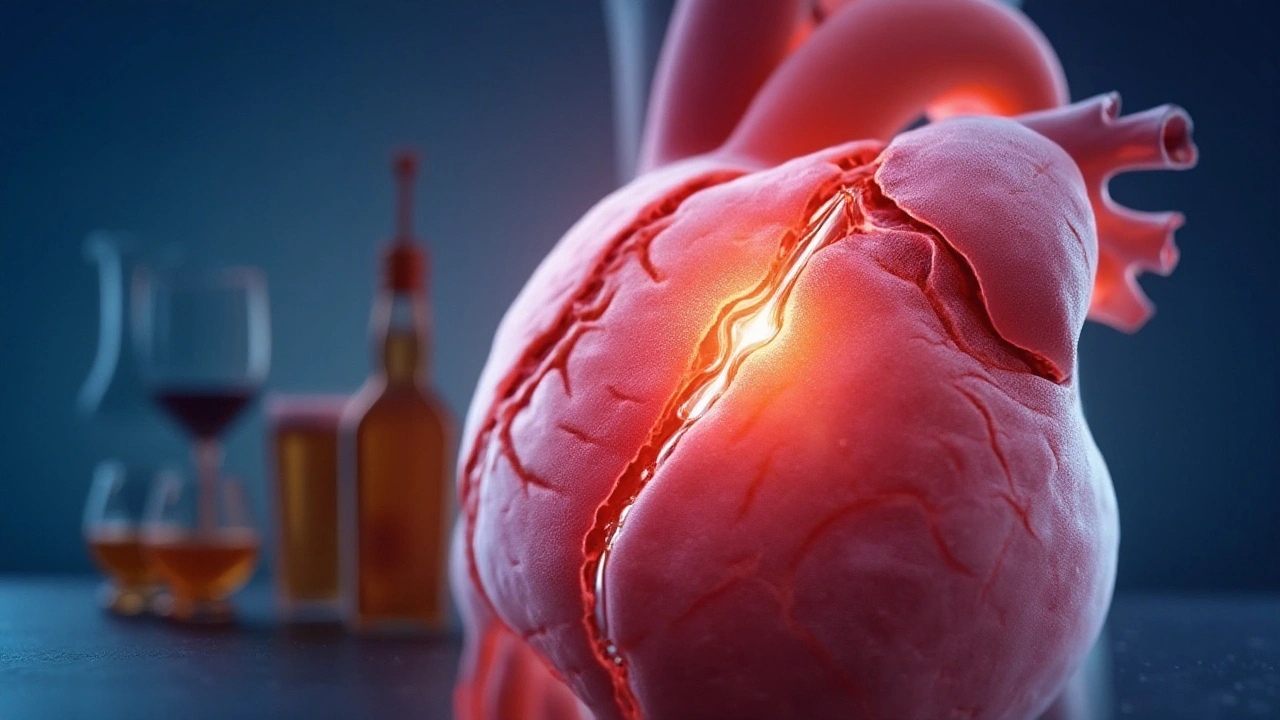As we navigate through discussions about cardiovascular health, a pivotal topic worth exploring is the impact of alcohol consumption on blood clots in stents. Many patients with cardiovascular diseases have stents placed to keep their arteries open. However, understanding how lifestyle choices, particularly alcohol intake, can affect these stents is crucial for maintaining long-term health.
Let's begin by examining what stents are and how they work to keep blood vessels open. These tiny tubes play a vital role but come with their own set of challenges, such as the risk of blood clots. How does alcohol factor into this equation? That's what we are here to find out, offering valuable insights and tips to make well-informed decisions about your heart health.
- The Basics of Stents and Blood Clots
- How Alcohol Interacts with Blood Thinners
- Positive and Negative Effects of Alcohol
- Tips for Safe Alcohol Consumption
The Basics of Stents and Blood Clots
When it comes to cardiovascular issues, stents are one of the marvels of modern medicine. These tiny, mesh-like tubes are inserted into narrowed or blocked arteries to keep them open, ensuring that blood can flow smoothly to the heart. Since they are often used during procedures like angioplasty, their role is pivotal in reducing chest pain and preventing heart attacks.
Now, let's dig deeper. After a stent is placed, the body begins a healing process. This can sometimes lead to the formation of blood clots around the stent, a condition known as stent thrombosis. Blood clots can be dangerous because they have the potential to completely block the artery, leading to severe heart complications.
To mitigate this risk, doctors usually prescribe antiplatelet medications, commonly known as blood thinners. These drugs, like aspirin and clopidogrel, help in preventing clot formation. However, their effectiveness can be influenced by various factors, including lifestyle choices. One key area of concern is alcohol consumption. How does it interact with these medications? How does it affect the overall health of the heart and the longevity of the stent?
Understanding the basics of stents and blood clots also involves knowing the types of stents available. There are bare-metal stents and drug-eluting stents. The former comes without any coating, while the latter is coated with medication that slowly releases over time to prevent the growth of scar tissue in the artery lining. Both types are susceptible to blood clot formation, although drug-eluting stents may slightly reduce this risk due to their medicinal coating.
Here's something interesting: According to the American Heart Association, the risk of stent thrombosis is relatively low, affecting approximately 1-2% of patients within the first year following stent placement. That still translates into thousands of individuals, making the topic crucial for patient education and lifestyle management.
Moreover, the material of the stent plays a role in clot formation. Most stents are made from metals like stainless steel or cobalt-chromium, which are biologically compatible materials. Despite this, the body may still recognize them as foreign objects and attempt to form clots around them.
"The innovation in stent technology has saved countless lives, but the risk of blood clots remains a concern that needs careful management," says Dr. John Smith, a leading cardiologist.
For anyone with a stent, knowing how it works and the potential complications can spell the difference between peace of mind and anxiety. It's this awareness that empowers you to make informed decisions about factors that can influence your health, like your diet, exercise, and yes, your alcohol consumption.
As we dive into more specifics in the following sections, you'll find practical tips and expert advice tailored to help you navigate through these concerns. Keeping your heart healthy involves more than just medical treatments; it's about the choices you make every day.

How Alcohol Interacts with Blood Thinners
When discussing the delicate balance of alcohol consumption and cardiovascular health, it's essential to delve into how alcohol interacts with blood thinners. These medications, often prescribed after the placement of stents, play a crucial role in preventing blood clots. But introducing alcohol to this mix can lead to unintended consequences.
Alcohol can influence the effectiveness of blood thinners in varied ways. For example, moderate drinking might thin the blood, enhancing the effects of the medication. While this could seem beneficial, it can actually increase the risk of excessive bleeding. On the other hand, heavy drinking can interfere with the metabolism of blood thinners, rendering them less effective and raising the likelihood of clot formation. Striking a balance is challenging but paramount.
Studies have shown that alcohol can interact with warfarin, a commonly prescribed blood thinner, by altering its levels in the bloodstream. Patients taking warfarin need to regularly monitor their blood clotting time to ensure they remain within a safe range. Alcohol can cause fluctuations in these levels, making it difficult for doctors to manage the medication effectively. Dr. John Smith, a cardiologist at the Heart Institute, once noted, "Even small amounts of alcohol can have a significant impact on the stability of blood thinning medications. Patients must be very cautious."
According to the American Heart Association, moderate alcohol consumption is defined as up to one drink per day for women and up to two drinks per day for men. However, it's crucial for patients with stents and those on blood thinners to consult their healthcare provider before consuming alcohol. Each individual's medical history and current medications can alter the dynamics of how alcohol will interact with their treatment plan.
For people who are prescribed newer blood thinners like clopidogrel, the interactions with alcohol can also be complex, though not as extensively studied. These medications inhibit platelets, making it less likely for clots to form in stents. However, alcohol can still amplify the anticoagulant effect, leading to similar concerns about bleeding. This is why ongoing medical supervision is critical for managing treatment effectively.
In some cases, alternate strategies may be recommended to balance alcohol consumption and blood thinner therapy safely. For instance, spacing out the timing between taking medication and having an alcoholic drink could help minimize risks. However, these recommendations must come from a healthcare professional to ensure they are tailored to the patient's specific needs and conditions.
Another aspect to consider is the type of alcohol consumed. Some studies suggest that certain types of alcohol, like red wine, might have beneficial effects on cardiovascular health due to the presence of antioxidants. However, this does not eliminate the risks associated with mixing alcohol and blood thinners. The quantity and frequency of consumption remain key factors that need careful management.
Patients are often encouraged to keep a log of their alcohol intake and any symptoms they experience. This information can be invaluable during consultations with healthcare providers, allowing for more personalized treatment plans and adjustments to medication if needed. Balancing alcohol and blood thinners is indeed a complex task, but with the right guidance, it can be managed effectively to maintain both safety and quality of life.

Positive and Negative Effects of Alcohol
When it comes to alcohol consumption, striking a balance between potential benefits and risks is essential, especially for those with cardiovascular concerns. Let's delve into the positive and negative effects that alcohol can have on individuals with stents.
Moderate alcohol consumption, such as having a glass of red wine, is often touted for its heart health benefits. Resveratrol, a compound found in red wine, has been shown to have antioxidant properties that may help protect the lining of blood vessels in your heart. Some studies suggest that moderate alcohol intake can increase HDL, or

Tips for Safe Alcohol Consumption
Ensuring safe alcohol consumption is vital, particularly for those with cardiovascular concerns, like stent placements. While indulging in a glass of wine or a pint of beer can be enjoyable, it is crucial to keep consumption at safe levels to avoid adverse health effects. Understanding the right balance can optimize the benefits while minimizing the risks. Let's break down some practical tips to navigate the fine line between enjoyment and health safety.
First, it's essential to understand what constitutes moderate drinking. For most people, moderate drinking means up to one drink per day for women and up to two drinks per day for men. This measurement can vary based on individual conditions and physician recommendations, so it’s advisable to consult your healthcare provider for personalized advice. Drinking within these limits can help manage your cardiovascular health by reducing the risk of developing blood clots in your stents.
Choosing the type of alcohol you consume also makes a difference. For instance, red wine has been shown to have cardiovascular benefits due to its high content of antioxidants, which help in reducing inflammation and promoting heart health. Conversely, heavy consumption of spirits or cocktails may not offer the same benefits and could lead to higher risks, including raising your blood pressure and contributing to clot formation.
Don't forget the importance of pacing yourself. Consuming your drinks slowly allows your body to process the alcohol more efficiently, reducing the likelihood of spikes in blood alcohol content that can lead to risky situations. It’s not just about drinking less but drinking smartly. Including water or non-alcoholic beverages between alcoholic drinks can help to moderate your intake and keep you hydrated.
A significant aspect of safe drinking is knowing your personal limits. Everyone’s body reacts differently to alcohol, and factors like age, weight, and medication can influence how you should approach alcohol consumption. If you find yourself feeling unwell or experiencing any adverse symptoms, it is crucial to stop drinking and seek medical advice. Remember, your long-term health is far more important than any temporary enjoyment.
Also, consider the social settings where you drink. Be mindful of environments that encourage heavy drinking, such as parties or celebrations. Make a conscious decision to stick to your limits irrespective of peer pressure. It’s okay to say no or opt for a non-alcoholic beverage instead. Being firm in your choices is a significant step toward maintaining good cardiovascular health.
Lastly, always keep in dialogue with your healthcare provider. Regular check-ups can help track how your alcohol consumption might be affecting your stent and overall heart health. Your doctor can provide tailored advice and adjustments based on your medical history and current condition. Remember, maintaining an open line of communication can make all the difference in managing your health effectively.
"It's important to enjoy life, but moderation and making informed choices are key," advises Dr. Jane Kelsey, a cardiologist with over 20 years of experience. "Always be aware of how alcohol interacts with your medications and overall health to stay on the safe side."
By taking these steps, you can enjoy your beverages responsibly while safeguarding your heart health. Remember, the goal is not to eliminate pleasure from your life but to balance it with mindful decisions that promote lasting well-being. Cheers to a heart-healthy lifestyle!


Cameron Perry
September 11, 2024 AT 12:33JOANNA WHITE
September 12, 2024 AT 10:20Lisa Uhlyarik
September 13, 2024 AT 21:24Kelley Akers
September 15, 2024 AT 04:48Tammy Cooper
September 16, 2024 AT 13:10Alyssa Hammond
September 17, 2024 AT 22:09Jill Amanno
September 19, 2024 AT 07:00Kate Calara
September 19, 2024 AT 16:16Chris Jagusch
September 21, 2024 AT 13:26Chris Bellante
September 22, 2024 AT 02:26Nicole Manlapaz
September 23, 2024 AT 01:05Frederick Staal
September 23, 2024 AT 18:49erin orina
September 24, 2024 AT 23:15Brandi Busse
September 25, 2024 AT 14:50Colter Hettich
September 26, 2024 AT 22:57Prem Mukundan
September 27, 2024 AT 13:31Leilani Johnston
September 28, 2024 AT 13:04Jensen Leong
September 29, 2024 AT 16:53Taylor Smith
October 1, 2024 AT 12:02Lisa Uhlyarik
October 1, 2024 AT 14:59